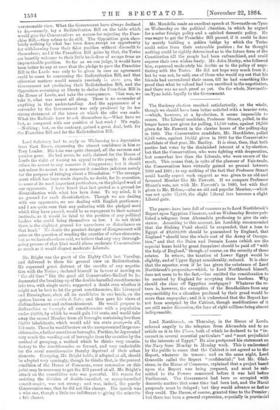Mr. Bright was the guest of the Eighty Club last
Tuesday, and delivered to them his general view on Redistribution. He expressed great distrust of the results of any negotia- tion with the Tories ; declared himself in favour of moving on "the old lines" like the good old Conservative-Radical he is ; deprecated the breaking-up of the double-barrelled constituencies into two, with single seats; suggested a doubt even whether it might not be best to let the great constituencies, like Liverpool and Birmingham, elect all its candidates in one batch, on the system known as serniin de lista ; and then gave his views of disfranchisement and enfranchisement. He would propose to disfranchise as boroughs all constituencies with a population under :20,000, by which he would gain 111 seats, and would take away the second Member from all boroughs containing less than 30,000 inhabitants, which would add ten seats rnore,—in all, 151 seats. These he would bestow on the unrepresented large con- stituencies, whether counties or boroughs. Further, he deprecated very much the weeding-out of boroughs from the counties by the method of grouping, a method which he thinks very unsatis- factory to the constituencies so formed, and very undesirable for the rural constituencies thereby deprived of their urban elements. Grouping, Mr. Bright holds, if adopted at all, should be adopted very sparingly, though he thinks that, in the present condition of the House of Commons, some concession on this point may be necessary to get the Bill passed at all. Mr. Bright's attack on the cumulative vote was powerful. His reason for resisting the division of double-barrelled, or many-barrelled constituencies, was not strong ; and was, indeed, the purely Conservative one, that he did not like change. His speech was a wise one, though a little too indifferent to giving the minority A fair chance.


































 Previous page
Previous page